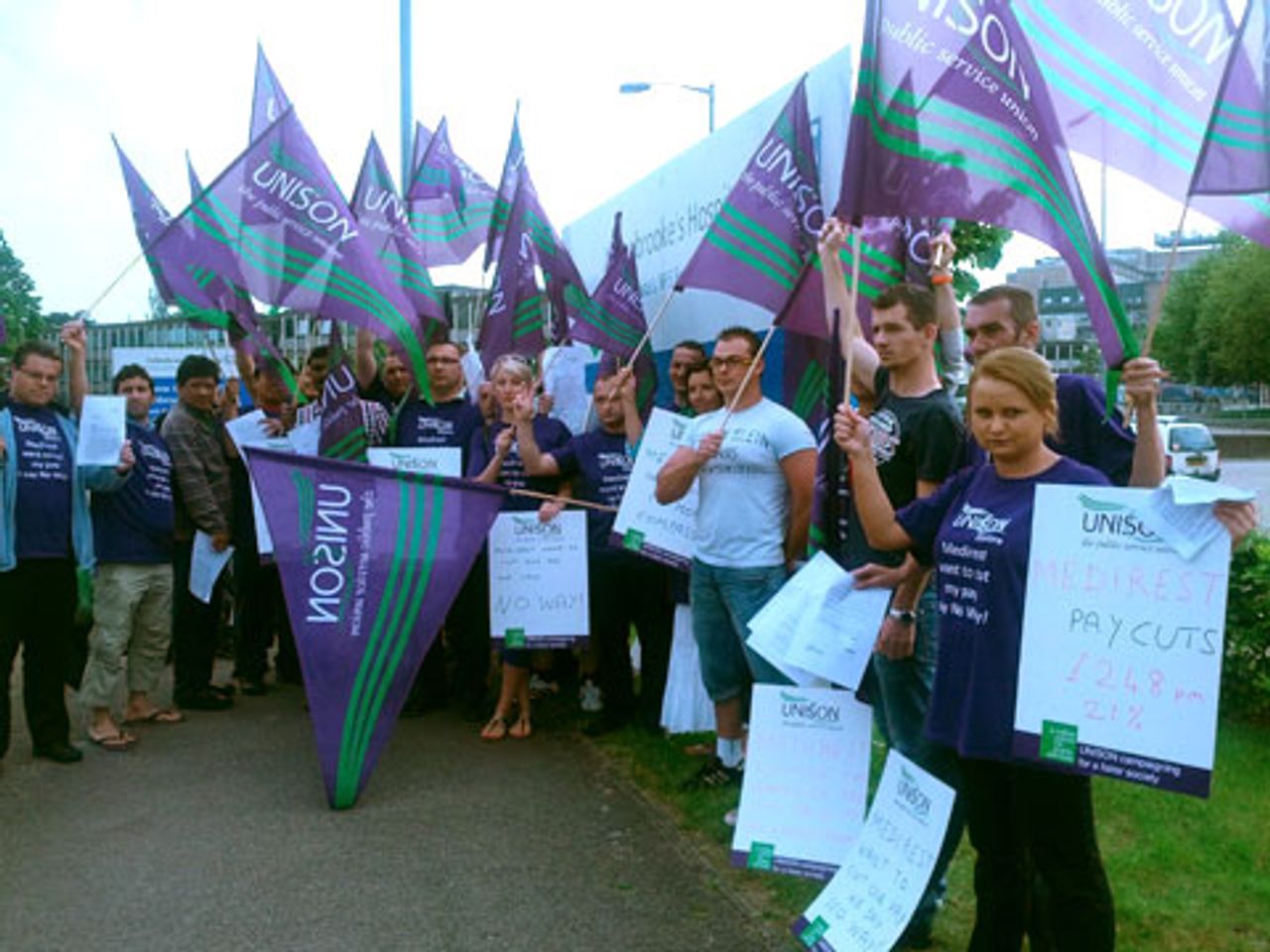 Workers protesting the NHS cuts
Workers protesting the NHS cutsThirty workers at Medirest, who clean theatres and clinics at Cambridge Addenbrookes Hospital, staged a protest to denounce changes to their shift patterns that will lead to a 21 percent pay cut. Their employer undercut other bidders promising to fulfil a contract £600,000 cheaper, with half the savings made by cutting wages.
Medirest is a subsidiary of London-based Compass Group that provides food and support services and operates in 50 different countries, with 470,000 employees. According to its web site, Compass has 90 of Fortune 100 companies as its clients.
In total, 45 workers, members of Unison trade union, will be affected by cost-cutting measures agreed between Medirest and National Health Service (NHS) managers. The workers burned letters sent by Medirest management instructing them to accept the new arrangements or face the sack. They are altering start and finishing times so that workers no longer qualify for unsociable hours payments.
Cleaners who play a key role in suppressing MRSA and other deadly bugs presently work for wages averaging between £13,000 and £15,000. Medirest cleaner Elizabetha Urbaniak explained, “Me and my husband both work the evening shift, and the changes will affect us twice over. We will lose £600 a month, but Medirest is expecting us to work the same number of hours.”
Gerald Tigalo said, “These proposals will have a big impact on my family. I can’t start work at the earlier time because I look after the children while my wife is at work. We need to pay our rent and other bills. If I lose £240 a month, we cannot survive.”
Workers have demanded a ballot for industrial action and urged patients to boycott shops in the hospital run by the company. Unison’s web site does not say they have agreed even to this demand and are still in negotiations with Medirest.
This is only the most recent confrontation between health workers and Medirest, which is spearheading attacks on wages and working conditions. Health workers employed by Medirest at High Wycombe and Amersham, Buckinghamshire and Southampton Hospital have engaged in sustained campaigns demanding parity working conditions and wages with other NHS workers.
The coalition government, NHS managers, and private contractors are working to suppress health workers’ wages through regional pay bargaining. According to Western Morning News, “Hospitals in the South West have been accused of clubbing together to bypass national pay agreements and create a cartel with the aim of suppressing wages. A total of 16 organisations—including hospitals in Exeter, Plymouth and Truro—all have board approval to sign up to the South West Pay, Terms and Conditions Consortium, with each asked to pay a joining fee of £10,000.”
The aim is to cut workforce costs in the region by 8 percent. The Health Service Journal cites a project document that states, “Unless ‘voluntary’ agreement could be secured…it is likely that trusts would be obliged to dismiss and re-engage staff to secure such changes.” NHS Employers director Dean Royles said that “employers recognise there is strength in numbers.”
Trade unions and professional associations in the NHS, including Unite, Unison, and the Royal College of Nursing issued a statement that essentially urged employers to make wage cuts with their collaboration.
Complaining that the resources being used on establishing an employer’s pay cartel “would be better utilised on working with staff locally to identify viable strategies for making efficiencies”, it ended that the unions involved “formally request that they return to working in partnership with trade unions and professional organisations to find solutions to financial challenges.”
Addenbrookes cleaners should take a warning from the conduct of Unison officials towards health care workers at Scottish charity Quarriers throughout 2011. After strike ballots, small isolated protests were held from April to September. These were used by Unison to wear down workers and then push through a 17 percent pay cut for staff.
When staff continued to oppose pay cuts, on September 30 Unison suspended all further scheduled strikes. Unison branch secretary Stephen Brown wrote to members threatening that the current offer “is the best that can be achieved by negotiation,” adding that “management will then proceed to dismiss and re-engage” should members continue to oppose the cuts.
Unison will treat cleaners at Addenbrookes in the same way. Already they are being isolated from the rest of the workforce in one of Britain’s biggest hospitals. Government and employers are putting themselves on a war footing, while the trade unions continue to limit any response to local and sectional protests as they impose management’s demands.
Fill out the form to be contacted by someone from the WSWS in your area about getting involved.
